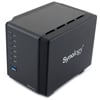 The Synology DS419slim is an ultra-compact 4-bay NAS that comes equipped with dual USB 3.0 ports (one on the back and one on the front), 2x 1GbE RJ-45 ports and supports 2.5-inch drives. Powered by a Marvell Armada 385 88F6820 dual-core 1.33GHz processor, this cube-shaped NAS is quoted to deliver over 220MB/s read and 94MB/s write in a dual Gigabit Link Aggregation environment. The DS419slim fits nicely in the home user demographic, especially those looking to create their own cloud solution or 24-hour backup device.
The Synology DS419slim is an ultra-compact 4-bay NAS that comes equipped with dual USB 3.0 ports (one on the back and one on the front), 2x 1GbE RJ-45 ports and supports 2.5-inch drives. Powered by a Marvell Armada 385 88F6820 dual-core 1.33GHz processor, this cube-shaped NAS is quoted to deliver over 220MB/s read and 94MB/s write in a dual Gigabit Link Aggregation environment. The DS419slim fits nicely in the home user demographic, especially those looking to create their own cloud solution or 24-hour backup device.
The Synology DS419slim is an ultra-compact 4-bay NAS that comes equipped with dual USB 3.0 ports (one on the back and one on the front), 2x 1GbE RJ-45 ports and supports 2.5-inch drives. Powered by a Marvell Armada 385 88F6820 dual-core 1.33GHz processor, this cube-shaped NAS is quoted to deliver over 220MB/s read and 94MB/s write in a dual Gigabit Link Aggregation environment. The DS419slim fits nicely in the home user demographic, especially those looking to create their own cloud solution or 24-hour backup device.
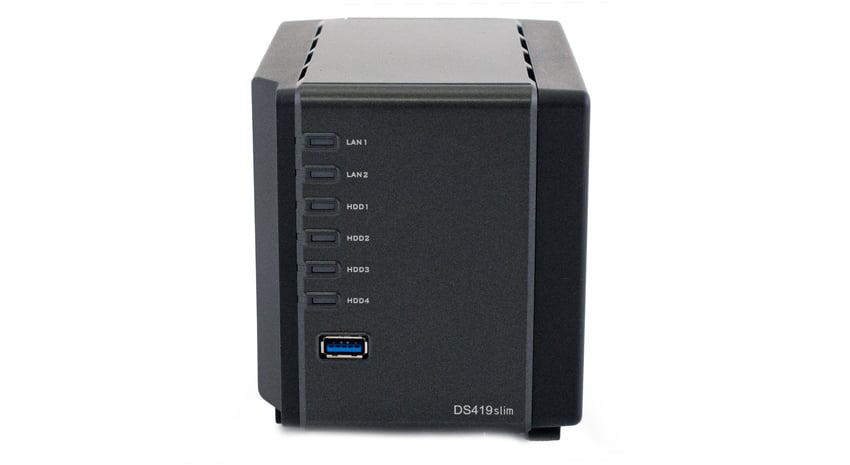
The DS419slim is also fairly power-efficient, as it consumes just 20 watts during data accessing and 7 watts during HDD hibernation. Like all Synology solutions, the DS419slim is managed by the Synology DiskStation Manager, a web-based and multitasking operating system that offers a ton of apps and features to make their NAS systems easy and effective to use and configure.
Like all Synology devices, the DS419slim is powered by the company's DiskStation Manager (DSM). Currently in version 6.2, DSM is easily the most user-friendly NAS OS on the market. It offers users the ability to configure storage capacity, easily manage personal clouds, and gives access to your DS419slim from anywhere at any time. Moreover, the DSM’s built-in Package Center gives users a plethora of applications to install, including those that enable cloud sharing, online photo albums, VPN features and more.
The Synology DiskStation DS419Slim is backed by a 2-year warranty.
Synology DiskStation DS419slim Specifications
| CPU | Marvell Armada 385 88F6820 dual-core 1.33GHz |
| Hardware encryption engine | Yes |
| Memory | 512MB DDR3L |
| Compatible drive type | 4 x 2.5” SATA HDD/SSD (drives not included) |
| Hot swappable drive | Yes |
| External port | 2 x USB 3.0 port |
| Size (HxWxD) | 120 x 105 x 142 mm |
| Weight | 0.66 kg |
| LAN | 2 x Gigabit (RJ-45) |
| Wake on LAN/WAN | yes |
| Scheduled power on/of | yes |
| System fan | 1 (60 x 60 x 10 mm) |
| AC input power voltage | 100V to 240V AC |
| Power frequency | 50/60Hz, single phase |
| Operating temperature | 5°C to 40°C (40°F to 104°F) |
| Storage temperature | -20°C to 60°C (-5°F to 140°F) |
| Relative humidity | 5% to 95% RH |
| Maximum operating altitude | 5,000 m (16,400 ft) |
| Networking protocol | SMB, AFP, NFS, FTP, WebDAV, CalDAV, iSCSI, Telnet, SSH, SNMP, VPN (PPTP, OpenVPN, L2TP) |
| Supported RAID type | Synology Hybrid RAID (SHR), Basic, JBOD, RAID 0, RAID 1, RAID 5, RAID 6, RAID 10 |
| Storage management | • Maximum single volume size: 16TB • Maximum internal volume: 256 |
| File sharing capability | • Maximum local user accounts: 1,024 • Maximum local groups: 256 • Maximum shared folders: 256 • Maximum concurrent SMB/NFS/AFP/FTP connections: 100 |
| Directory service | Windows AD integration: Domain users login via SMB/NFS/AFP/FTP/File Station, LDAP integration |
| Security | Firewall, encrypted shared folder, SMB encryption, FTP over SSL/TLS, SFTP, rsync over SSH, login auto block, Let's Encrypt support, HTTPS (customizable cipher suite) |
| Warranty | 2 years |
Design and Build
Featuring an all-black build, the DS419slim is perfect for those looking for a compact NAS with small physical footprint. It measures in at under 5 inches tall and 4 inches wide at roughly 1.5lbs. This NAS will sit nicely and firmly alongside a workstation.
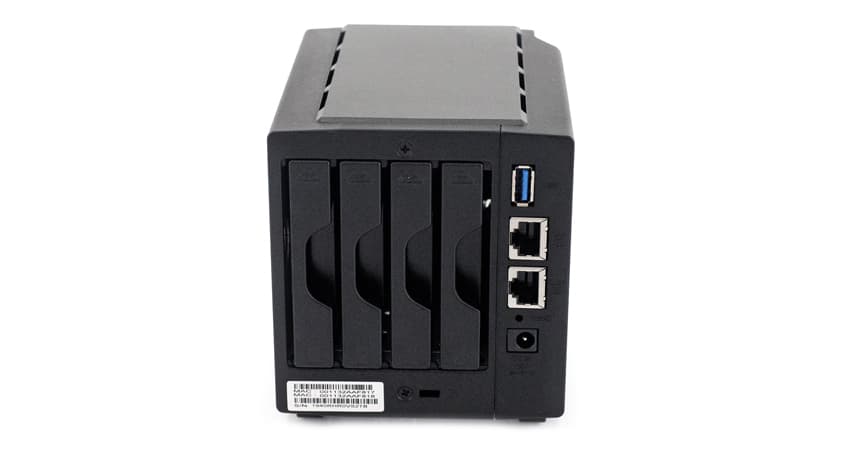
The front of the NAS is very minimalistic with just the LED indicators (LAN and drive statuses) and a USB 3.0 port.
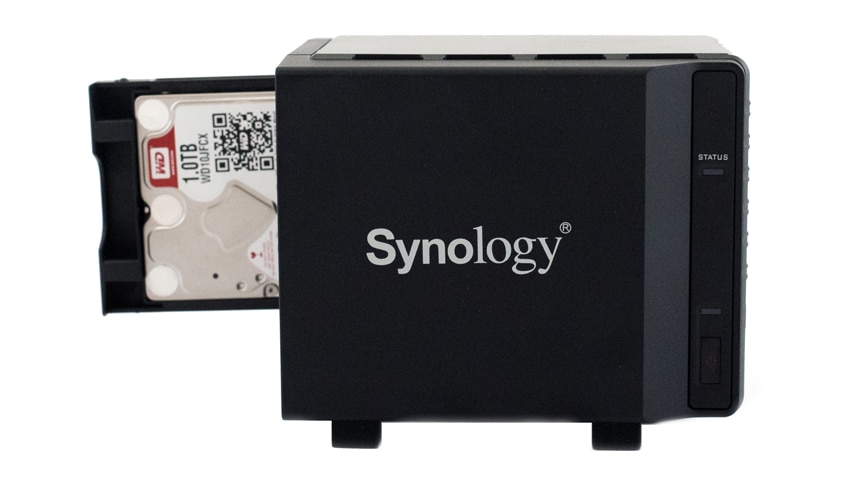
Turning around the Synology NAS to the rear gives easy access to the 4 hot-swappable bays. Also on the back are two 1GbE ports, one USB 3.0 port, lower port, and a Kensington security slot.
Review Configuration
For our testing we configured the Synology DiskStation in RAID6 using four 1TB WD Red 2.5" HDDs and RAID1 with two 480GB Seagate IronWolf SSDs. Each disk configuration used EXT4 volumes and measured iSCSI and CIFS performance across two 1GbE LAN connections.
Enterprise Synthetic Workload Analysis
Our enterprise shared storage and hard drive benchmark process preconditions each drive into steady-state with the same workload the device will be tested with under a heavy load of 16 threads with an outstanding queue of 16 per thread, and then tested in set intervals in multiple thread/queue depth profiles to show performance under light and heavy usage. Since hard drives reach their rated performance level very quickly, we only graph out the main sections of each test.
Preconditioning and Primary Steady-State Tests:
- Throughput (Read+Write IOPS Aggregate)
- Average Latency (Read+Write Latency Averaged Together)
- Max Latency (Peak Read or Write Latency)
- Latency Standard Deviation (Read+Write Standard Deviation Averaged Together)
Our Enterprise Synthetic Workload Analysis includes four profiles based on real-world tasks. These profiles have been developed to make it easier to compare to our past benchmarks as well as widely-published values such as max 4k read and write speed and 8k 70/30, which is commonly used for enterprise drives.
- 4K
- 100% Read or 100% Write
- 100% 4K
- 8K 70/30
- 70% Read, 30% Write
- 100% 8K
- 8K (Sequential)
- 100% Read or 100% Write
- 100% 8K
- 128K (Sequential)
- 100% Read or 100% Write
- 100% 128K
In the first of our enterprise workloads, we measured a long sample of random 4K performance with 100% write and 100% read activity. Looking at IOPS, the DS419slim had its best SSD RAID1 performance in iSCSI with 11,940 IOPS read and 13,204 IOPS write. In RAID6 with HDDs, the slim posted its best write in iSCSI with 930 IOPS and best read in CIFS, with 191 IOPS.
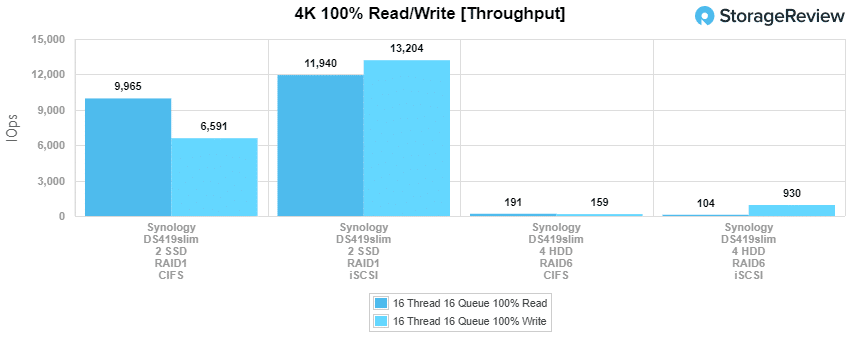
With 4K average latency, the DS419slim had its best RAID1 performance in iSCSI with 21.44ms read and 19.39ms write while the RAID6 showed its best write performance in iSCSI (275.14ns) and best read performance in CIFS (1,332.86ms).
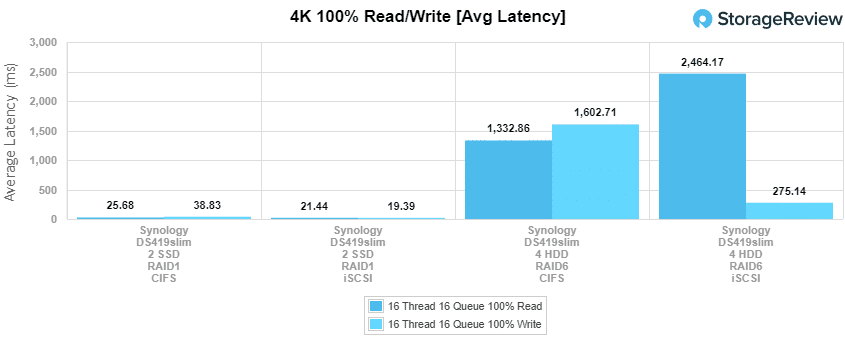
In 4K max latency, the DS419slim had 349.6ms read and 63.7ms write in iSCSI (RAID1) and 130ms read and 135ms write in iSCSI (RAID1). As expected, RAID6 performance had its best read and write speeds in iSCSI (1,450.6ms) and CIFS (9,335.7ms), respectively.
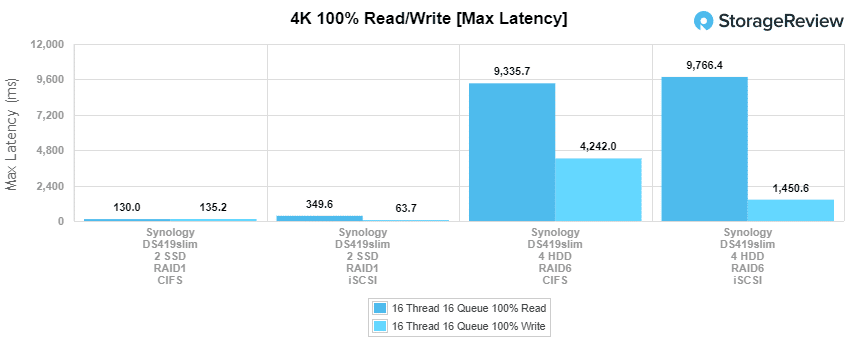
For 4K standard deviation we saw, the DS419slim (RAID1) performed slightly better again in iSCSI with 22.07ms read and 17.55ms write. The HDDs in RAID6 had the best performance of 146.13ms in iSCSI and 1,755.6ms in CIFS.
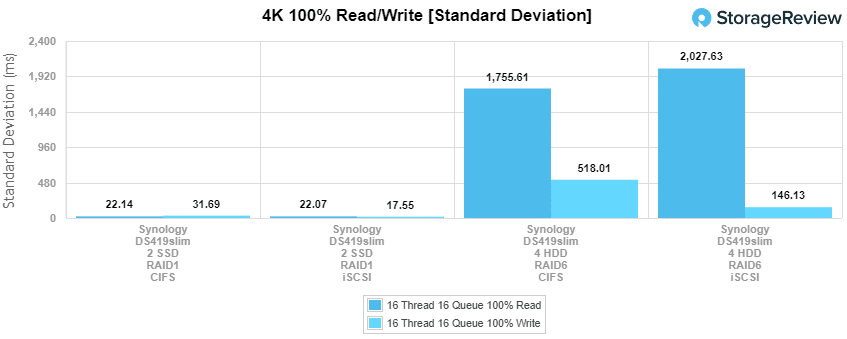
Our next benchmark measures 100% 8K sequential throughput with a 16T16Q load in 100% read and 100% write operations. Here, results were much more consistent. The top read performer in RAID1 was during the CIFS, where it posted 25,929 IOPS, while iSCSI posted the top write speeds with 14,346 IOPS. In RAID6, CIFS had the best writes and reads, with 13,130 IOPS and 25,019 IOPS, respectively.
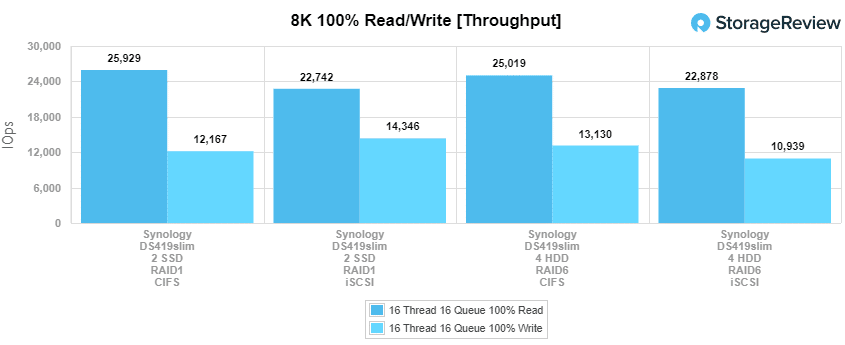
Compared to the fixed 16 thread, 16 queue max workload we performed in the 100% 4K write test, our mixed workload profiles scale the performance across a wide range of thread/queue combinations. In these tests, we span workload intensity from 2 threads and 2 queue up to 16 threads and 16 queue. In throughput, though it started out slower, the best DS419slim RAID1 configuration was iSCSI, posting a range of 3,705 IOPS to 6,100 in the terminal queue depths. In RAID6, iSCSI also showed the best performance with a range if 176 IOPS to 251.
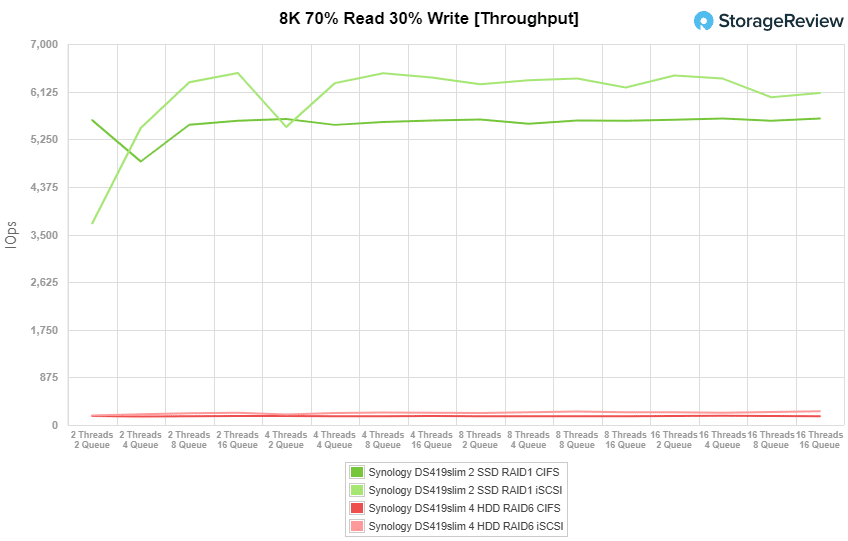
In average latency, CIFS connectivity showed the best performance in our SSD configuration in both RAID1 and RAID6, posting a range of 5.71ms to 22.72ms and 190.2ms to 782.85ms, respectively. Both configurations started out much slower than iSCSI, though were much more stable by the end of the test.
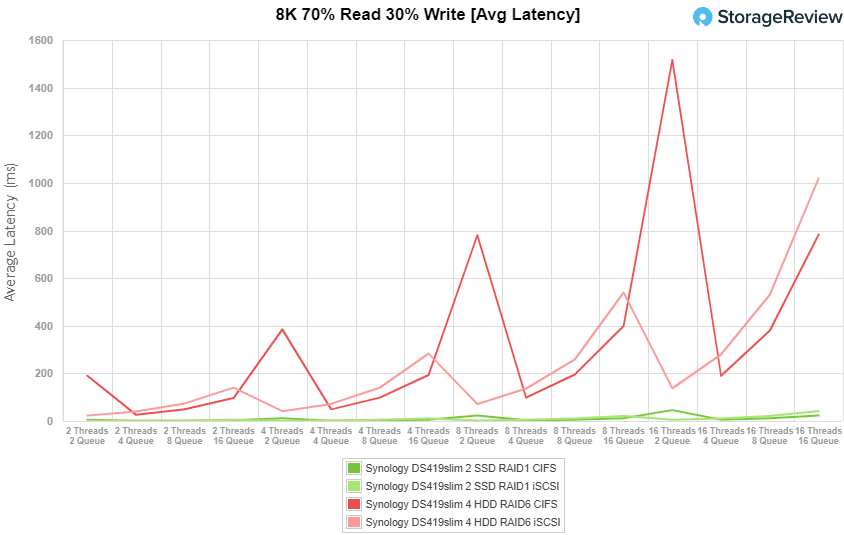
For maximum latency, the CIFS configurations again had a slow start, but performance stabilized quite well by the later queue depths, posting a range of 124.76ms to 220.47ms and 2,856.15ms to 5,341.66ms for RAID1 and RAID6, respectively.
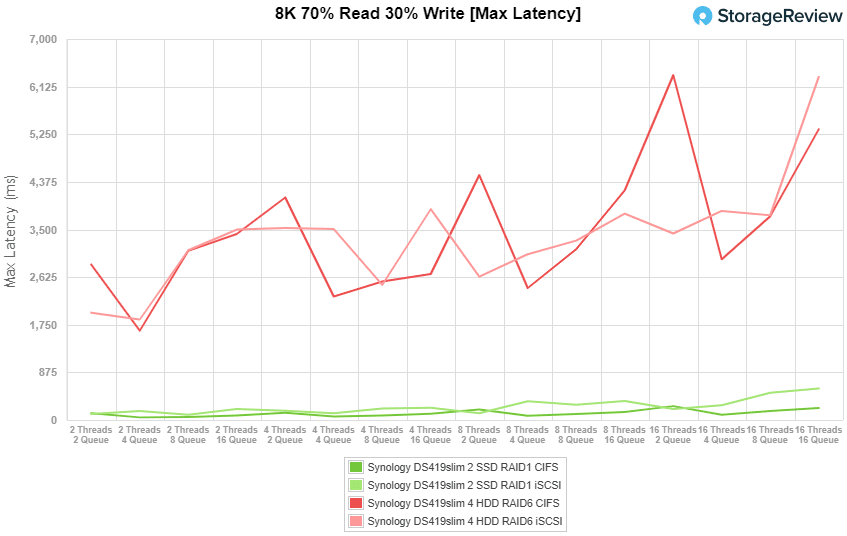
Next, we move on to the standard deviation. Here, the DS419slim posted its best performance in CIFS by the end of the test, with terminal queue depths of 16.18ms (RAID1) and 635.03ms (RAID6).
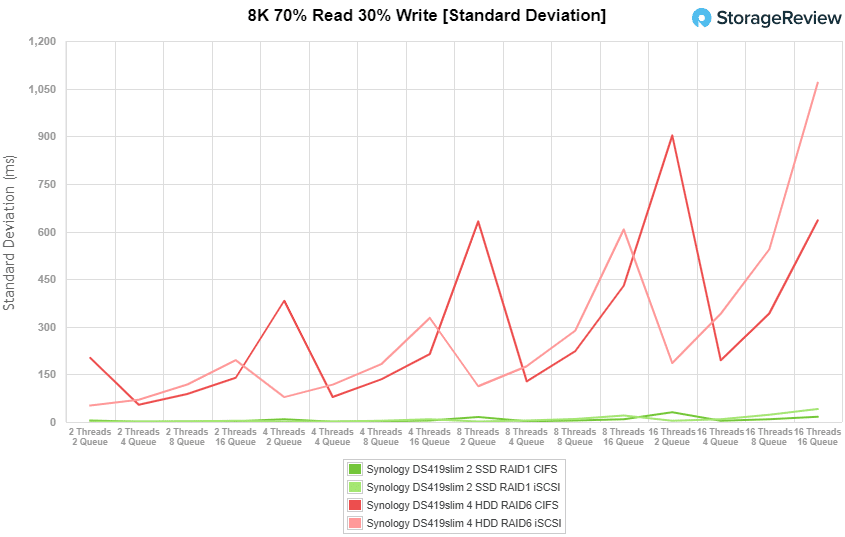
The last Enterprise Synthetic Workload benchmark is our 128K test, which is a large-block sequential test that shows the highest sequential transfer speed for a device. In this workload scenario, all configurations posted relatively the same read performance hovering around the 230MB/s mark. Top writes occurred during the CIFS RAID1 configuration, which posted 159MB/s, while RAID1 iSCSI had 130MB/s, RAID6 CIFS had 163MB/s and RAID6 iSCSI had 107MB/s.
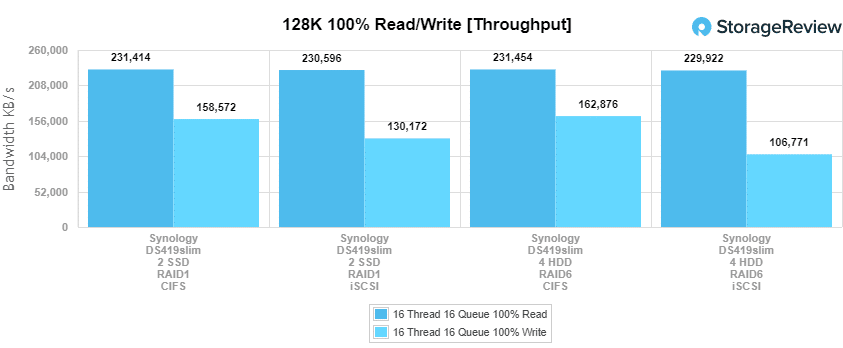
Conclusion
The DS419slim is a great NAS for those looking for a personal 24-hour cloud solution that takes up very little space. This 4-bay DiskStation uses a minimalist design, comes with the usual suspects for connectivity (dual USB 3.0 and 1GbE RJ-45 ports), and is powered by a dual-core processor. The DS419slim also comes packed with software via their DSM OS. With Synology Drive, users can sync all their files living on the DS419slim across Windows, macOS and Linux computer platforms. It also gives access to their files on mobile devices. Moreover, Cloud Sync keeps all content on Dropbox, Google Drive, Microsoft OneDrive, Baidu, and Box storage in sync with the DS419slim as well.
For performance we looked at both RAID1 with SSDs and RAID6 with HDDs configurations using iSCSI and CIFS connectivity. The NAS showed much stronger performance in iSCSI during our 4K tests with highlights including 11,940 IOPS read and 13,204 IOPS write, and average latencies of 21.44ms read and 19.39ms write (RAID1). In 8K 100%, CIFS had the best RAID1 read performance with 25,929 IOPS, while iSCSI posted the top write speeds of 14,346 IOPS. Our RAID6 configuration wasn’t far behind using CIFS connectivity, which posted 13,130 IOPS and 25,019 IOPS, in write and reads, respectively.
In our mixed workload profiles, the DS419slim showed better overall latency performance in CIFS, posting an average latency range of 5.71ms to 22.72ms and 190.2ms to 782.85ms in RAID1 and RAID6, respectively. However, though iSCSI started slow, still posted the best throughput results in the RAID1 configuration with a range of 3,705 IOPS to 6,100 in the terminal queue depths. RAID6 iSCSI also showed the best throughput performance with a range if 176 IOPS to 251 IOPS.
Overall the Synology DiskStation DS419slim offers a wide range of capabilities in a very small footprint. For buyers requiring a super small footprint, but still want the extensive software offerings of the DSM OS, this model has you covered. The small form factor does limit you on capacity and performance, which is the tradeoff you need to consider. If you can work with a larger model Synology has your bases covered as well.
Synology DiskStation DS419slim
Sign up for the StorageReview newsletter
